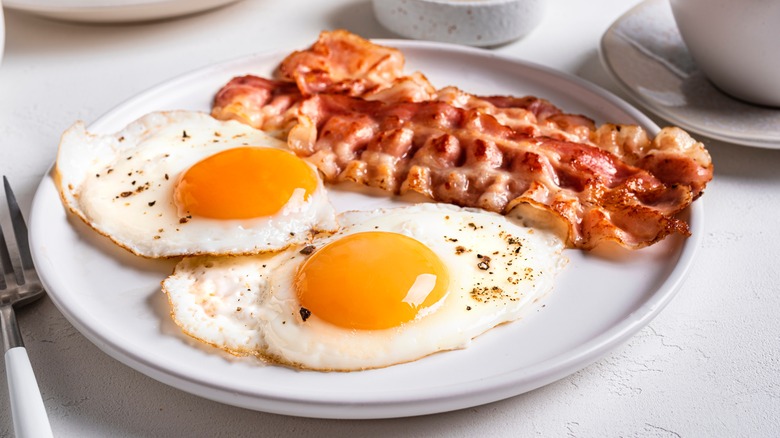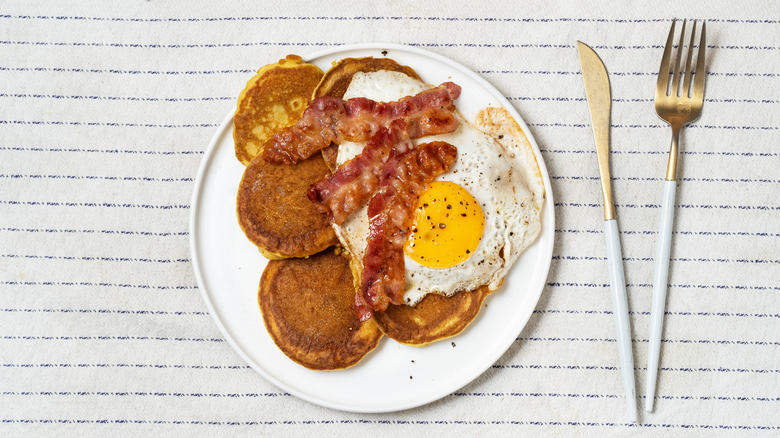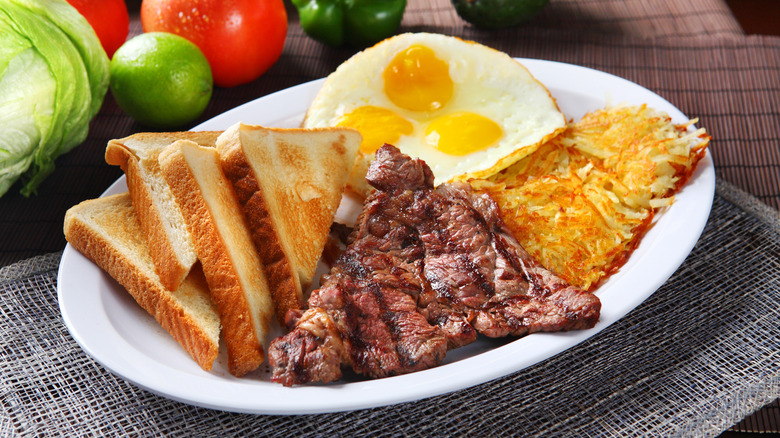Why Do Fried Eggs At A Diner Always Taste Better Than Homemade?
It's the perpetually frustrating question of home cooks everywhere: why does my food not taste as good as what I can order at a restaurant? It's an especially aggravating question when the meal you're trying to make is as simple as a few fried eggs.
The biggest secret that often gets overlooked is that diner chefs simply get more practice than you. You could make fried eggs for every meal every day for a month, and you still likely won't have gone through as many eggs as a busy diner chef does in a single day. You don't need 10,000 hours of egg making to make a mean fried egg, but it certainly helps.
The other secret is that diner chefs typically make fried eggs on a flat top griddle. This is better than even your best pan for two reasons. The biggest is that it's completely flat (and ideally level), so fried eggs can't slide around. That flatness also helps maintain a more consistent, even temperature. Both eliminate many variables, helping the cook's skill truly shine.
How to make diner-quality fried eggs at home
There's nothing to do about practicing except to practice, but please don't make eggs you aren't going to eat or serve. The griddle is another story. You can grab a reversible griddle to sit on your range that's both a flat top and a faux grill, or a small electric griddle to use anywhere. If you're dead serious, you could also get an outdoor flat top grill, though this is a much larger investment.
You can also employ a few small techniques to improve your fried eggs. A great way to set the whites of fried eggs without overcooking the yolk is to place a lid over the pan, letting the heat and steam inside take care of everything. Splash some water around the eggs for more steam, if needed.
You should also pay attention to temperatures. Let your eggs come up to room temperature before cooking at a low to medium temperature. Both steps help your eggs cook more evenly. Finally, to ensure you don't break the yolks while cracking the shell, crack your eggs gently against a flat surface like a counter, instead of sharply against an edge.
Ingredients to improve your fried eggs
Delicious fried eggs require more than just technique. You also need to use the right ingredients to give them delicious flavor. You have two opportunities to add flavor to your eggs: changing what you cook them in, and changing your seasonings.
To make a fried egg, some kind of fat is required. Butter is common, as is oil (or even both at once). Rendered animal fats such as lard or leftover bacon grease are excellent choices, too. You can add seasonings to the fat, such as tomato paste, or cook the eggs in a mixture of fat and sauces such as balsamic vinegar or even your favorite barbecue sauce.
For seasonings, start with salt and plenty of it, as well as some freshly-ground pepper. A pinch of cayenne or red pepper flakes can add some nice heat while also lending a pop of color to your plate. Likewise, garlic and onion powder can add a savory edge and makes an especially great mix for a steak and eggs breakfast. Just remember that powdery seasoning don't dissolve easily in eggs. As such, add spices lightly to avoid a gritty final product.


